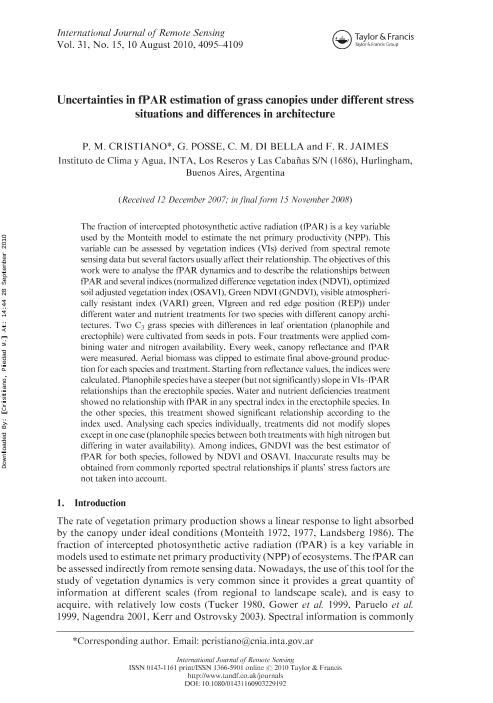Mostrar el registro sencillo del ítem
dc.contributor.author
Cristiano, Piedad María

dc.contributor.author
Posse, G.
dc.contributor.author
Di Bella, Carlos Marcelo

dc.contributor.author
Jaimes, Florencia Romina

dc.date.available
2023-03-08T18:20:27Z
dc.date.issued
2010-08
dc.identifier.citation
Cristiano, Piedad María; Posse, G.; Di Bella, Carlos Marcelo; Jaimes, Florencia Romina; Uncertainties in fPAR estimation of grass canopies under different stress situations and differences in architecture; Taylor & Francis Ltd; International Journal of Remote Sensing; 31; 15; 8-2010; 4095-4109
dc.identifier.issn
0143-1161
dc.identifier.uri
http://hdl.handle.net/11336/189979
dc.description.abstract
The fraction of intercepted photosynthetic active radiation (fPAR) is a key variable used by the Monteith model to estimate the net primary productivity (NPP). This variable can be assessed by vegetation indices (VIs) derived from spectral remote sensing data but several factors usually affect their relationship. The objectives of this work were to analyse the fPAR dynamics and to describe the relationships between fPAR and several indices (normalized difference vegetation index (NDVI), optimized soil adjusted vegetation index (OSAVI), GreenNDVI (GNDVI), visible atmospherically resistant index (VARI) green, VIgreen and red edge position (REP)) under different water and nutrient treatments for two species with different canopy architectures. Two C3 grass species with differences in leaf orientation (planophile and erectophile) were cultivated from seeds in pots. Four treatments were applied combining water and nitrogen availability. Every week, canopy reflectance and fPAR were measured. Aerial biomass was clipped to estimate final above-ground production for each species and treatment. Starting from reflectance values, the indices were calculated. Planophile species have a steeper (but not significantly) slope inVIs-fPAR relationships than the erectophile species. Water and nutrient deficiencies treatment showed no relationship with fPAR in any spectral index in the erectophile species. In the other species, this treatment showed significant relationship according to the index used. Analysing each species individually, treatments did not modify slopes except in one case (planophile species between both treatments with high nitrogen but differing in water availability). Among indices, GNDVI was the best estimator of fPAR for both species, followed by NDVI and OSAVI. Inaccurate results may be obtained from commonly reported spectral relationships if plants' stress factors are not taken into account.
dc.format
application/pdf
dc.language.iso
eng
dc.publisher
Taylor & Francis Ltd

dc.rights
info:eu-repo/semantics/openAccess
dc.rights.uri
https://creativecommons.org/licenses/by-nc-sa/2.5/ar/
dc.subject
CANOPY REFLECTANCE
dc.subject
GRASSLAND
dc.subject
VEGETATION INDEX
dc.subject.classification
Ecología

dc.subject.classification
Ciencias Biológicas

dc.subject.classification
CIENCIAS NATURALES Y EXACTAS

dc.title
Uncertainties in fPAR estimation of grass canopies under different stress situations and differences in architecture
dc.type
info:eu-repo/semantics/article
dc.type
info:ar-repo/semantics/artículo
dc.type
info:eu-repo/semantics/publishedVersion
dc.date.updated
2023-03-08T13:02:47Z
dc.identifier.eissn
1366-5901
dc.journal.volume
31
dc.journal.number
15
dc.journal.pagination
4095-4109
dc.journal.pais
Reino Unido

dc.journal.ciudad
Londres
dc.description.fil
Fil: Cristiano, Piedad María. Consejo Nacional de Investigaciones Científicas y Técnicas; Argentina. Instituto Nacional de Tecnología Agropecuaria. Centro de Investigación de Recursos Naturales. Instituto de Clima y Agua; Argentina
dc.description.fil
Fil: Posse, G.. Instituto Nacional de Tecnología Agropecuaria. Centro de Investigación de Recursos Naturales. Instituto de Clima y Agua; Argentina
dc.description.fil
Fil: Di Bella, Carlos Marcelo. Consejo Nacional de Investigaciones Científicas y Técnicas; Argentina. Instituto Nacional de Tecnología Agropecuaria. Centro de Investigación de Recursos Naturales. Instituto de Clima y Agua; Argentina
dc.description.fil
Fil: Jaimes, Florencia Romina. Consejo Nacional de Investigaciones Científicas y Técnicas; Argentina. Instituto Nacional de Tecnología Agropecuaria. Centro de Investigación de Recursos Naturales. Instituto de Clima y Agua; Argentina
dc.journal.title
International Journal of Remote Sensing

dc.relation.alternativeid
info:eu-repo/semantics/altIdentifier/url/https://www.tandfonline.com/doi/abs/10.1080/01431160903229192
dc.relation.alternativeid
info:eu-repo/semantics/altIdentifier/doi/https://doi.org/10.1080/01431160903229192
Archivos asociados
